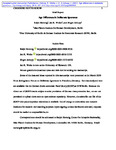Age differences in deliberate ignorance.
| dc.contributor.author | Hertwig, Ralph | |
| dc.contributor.author | Woike, Jan Kristian | |
| dc.contributor.author | Schupp, J | |
| dc.date.accessioned | 2021-08-09T19:34:10Z | |
| dc.date.available | 2021-08-09T19:34:10Z | |
| dc.date.issued | 2021-06 | |
| dc.identifier.issn | 0882-7974 | |
| dc.identifier.issn | 1939-1498 | |
| dc.identifier.uri | http://hdl.handle.net/10026.1/17531 | |
| dc.description.abstract |
People sometimes choose to remain ignorant, even when information comes at low marginal costs and promises high utility. To investigate whether older adults enlist deliberate ignorance more than younger adults, potentially as an emotion-regulation tool, we presented a representative sample of 1,910 residents of Germany with 13 scenarios in which knowledge could result in substantial gains or losses. The strongest correlate of deliberate ignorance was indeed age. Openness to experience was negatively correlated with deliberate ignorance; risk preference did not and neuroticism did not consistently predict it. Findings suggest a possible positivity effect in the decision to access new but ambiguous information. (PsycInfo Database Record (c) 2021 APA, all rights reserved). | |
| dc.format.extent | 407-414 | |
| dc.format.medium | Print-Electronic | |
| dc.language | en | |
| dc.language.iso | eng | |
| dc.publisher | American Psychological Association (APA) | |
| dc.rights | Attribution-NonCommercial-NoDerivatives 4.0 International | |
| dc.rights | Attribution-NonCommercial-NoDerivatives 4.0 International | |
| dc.rights | Attribution-NonCommercial-NoDerivatives 4.0 International | |
| dc.rights.uri | http://creativecommons.org/licenses/by-nc-nd/4.0/ | |
| dc.rights.uri | http://creativecommons.org/licenses/by-nc-nd/4.0/ | |
| dc.rights.uri | http://creativecommons.org/licenses/by-nc-nd/4.0/ | |
| dc.subject | deliberate ignorance | |
| dc.subject | uncertainty | |
| dc.subject | emotion regulation | |
| dc.subject | positivity effect | |
| dc.subject | aging | |
| dc.title | Age differences in deliberate ignorance. | |
| dc.type | journal-article | |
| dc.type | Journal Article | |
| plymouth.author-url | https://www.webofscience.com/api/gateway?GWVersion=2&SrcApp=PARTNER_APP&SrcAuth=LinksAMR&KeyUT=WOS:000662093600001&DestLinkType=FullRecord&DestApp=ALL_WOS&UsrCustomerID=11bb513d99f797142bcfeffcc58ea008 | |
| plymouth.issue | 4 | |
| plymouth.volume | 36 | |
| plymouth.publication-status | Published online | |
| plymouth.journal | Psychology and Aging | |
| dc.identifier.doi | 10.1037/pag0000603 | |
| plymouth.organisational-group | /Plymouth | |
| plymouth.organisational-group | /Plymouth/Faculty of Health | |
| plymouth.organisational-group | /Plymouth/Faculty of Health/School of Psychology | |
| plymouth.organisational-group | /Plymouth/REF 2021 Researchers by UoA | |
| plymouth.organisational-group | /Plymouth/REF 2021 Researchers by UoA/UoA04 Psychology, Psychiatry and Neuroscience | |
| plymouth.organisational-group | /Plymouth/REF 2021 Researchers by UoA/UoA04 Psychology, Psychiatry and Neuroscience/UoA04 Psychology, Psychiatry and Neuroscience MANUAL | |
| plymouth.organisational-group | /Plymouth/Users by role | |
| plymouth.organisational-group | /Plymouth/Users by role/Academics | |
| dc.publisher.place | United States | |
| dc.identifier.eissn | 1939-1498 | |
| dc.rights.embargoperiod | Not known | |
| rioxxterms.versionofrecord | 10.1037/pag0000603 | |
| rioxxterms.licenseref.uri | http://creativecommons.org/licenses/by-nc-nd/4.0/ | |
| rioxxterms.type | Journal Article/Review |



